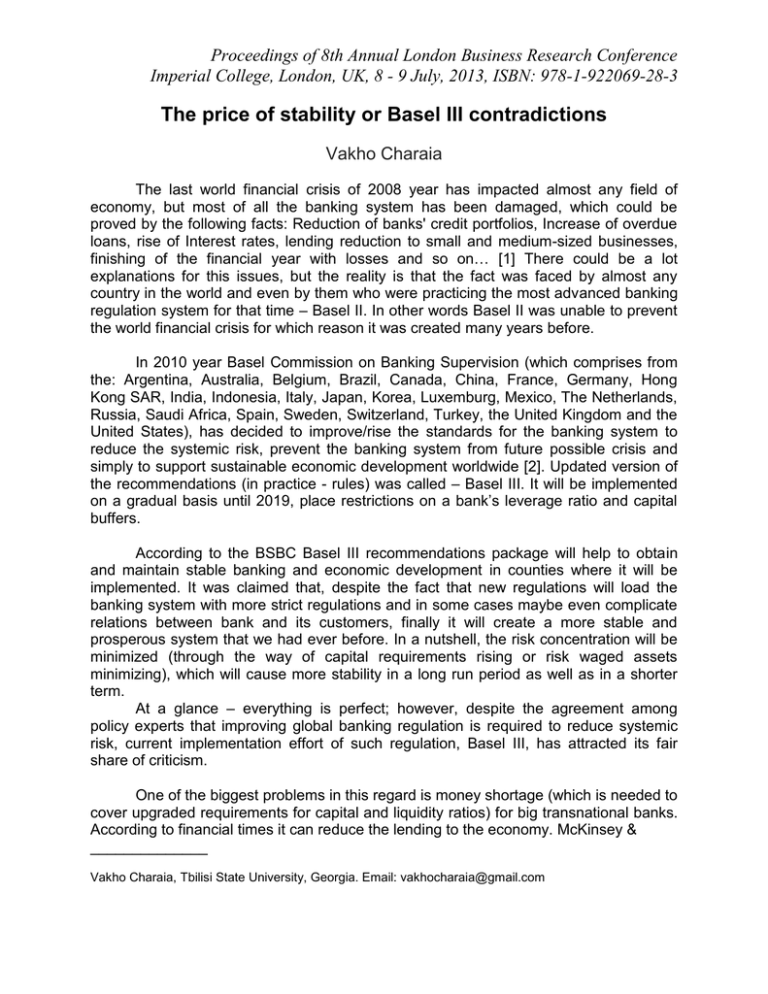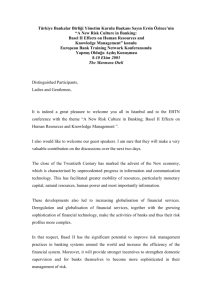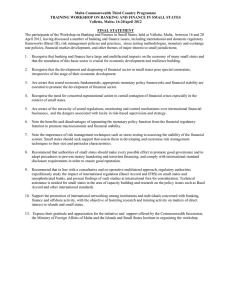Proceedings of 8th Annual London Business Research Conference
advertisement

Proceedings of 8th Annual London Business Research Conference Imperial College, London, UK, 8 - 9 July, 2013, ISBN: 978-1-922069-28-3 The price of stability or Basel III contradictions Vakho Charaia The last world financial crisis of 2008 year has impacted almost any field of economy, but most of all the banking system has been damaged, which could be proved by the following facts: Reduction of banks' credit portfolios, Increase of overdue loans, rise of Interest rates, lending reduction to small and medium-sized businesses, finishing of the financial year with losses and so on… [1] There could be a lot explanations for this issues, but the reality is that the fact was faced by almost any country in the world and even by them who were practicing the most advanced banking regulation system for that time – Basel II. In other words Basel II was unable to prevent the world financial crisis for which reason it was created many years before. In 2010 year Basel Commission on Banking Supervision (which comprises from the: Argentina, Australia, Belgium, Brazil, Canada, China, France, Germany, Hong Kong SAR, India, Indonesia, Italy, Japan, Korea, Luxemburg, Mexico, The Netherlands, Russia, Saudi Africa, Spain, Sweden, Switzerland, Turkey, the United Kingdom and the United States), has decided to improve/rise the standards for the banking system to reduce the systemic risk, prevent the banking system from future possible crisis and simply to support sustainable economic development worldwide [2]. Updated version of the recommendations (in practice - rules) was called – Basel III. It will be implemented on a gradual basis until 2019, place restrictions on a bank’s leverage ratio and capital buffers. According to the BSBC Basel III recommendations package will help to obtain and maintain stable banking and economic development in counties where it will be implemented. It was claimed that, despite the fact that new regulations will load the banking system with more strict regulations and in some cases maybe even complicate relations between bank and its customers, finally it will create a more stable and prosperous system that we had ever before. In a nutshell, the risk concentration will be minimized (through the way of capital requirements rising or risk waged assets minimizing), which will cause more stability in a long run period as well as in a shorter term. At a glance – everything is perfect; however, despite the agreement among policy experts that improving global banking regulation is required to reduce systemic risk, current implementation effort of such regulation, Basel III, has attracted its fair share of criticism. One of the biggest problems in this regard is money shortage (which is needed to cover upgraded requirements for capital and liquidity ratios) for big transnational banks. According to financial times it can reduce the lending to the economy. McKinsey & ______________ Vakho Charaia, Tbilisi State University, Georgia. Email: vakhocharaia@gmail.com Proceedings of 8th Annual London Business Research Conference Imperial College, London, UK, 8 - 9 July, 2013, ISBN: 978-1-922069-28-3 Company argues that Basel III’s new capital requirements (enlarged quality and quantity of assets), will create a brutal shortage of money in the European banking sector and by 2019 the banking system will need almost €1.1 trillion of additional Tier 1 capital, €1.3 trillion of short-term liquidity, and about €2.3 trillion of long-term funding [3]. Almost the same future is predicted for the US banking sector. The impact seems to be to some extent smaller (because of the smaller size of the banking sector), McKinsey & Company estimates that Tier 1 capital shortfall will equal to $870 billion (€600 billion), the gap in short term liquidity at $800 billion (€570 billion), and the gap in long-term funding at $3.2 trillion (€2.2 trillion) [4]. McKinsey’s research also highlighted that after full implementation of Basel recommendations European banks’ pretax return on equity (ROE) would decrease by between 3.7 - 4.3 % from the pre-crisis level of 15 percent [5]. However, different sorts of the banking sectors (corporate, retail and investment banks) most probably will be affected in a different manner. For instance: Corporate banking system may be impact through price rising on the following product and services: uncommitted credit lines, long-term corporate loans, and long-term asset based finance businesses. Retail banking will be presumably more affected than that of wholesale banking. It could be explained by the fact that retail banks are already operating under lower capital ratios compared to wholesale banks, consequently increased capital requirement will push their products price higher in a way of either higher fees or higher interests on loans. Finally, investment banking will probably face more changes in product and service offerings because they are more complex in nature than those offered by retail or corporate banking. According to OECD study minor macroeconomic impact of 1% increase in bank capital to risk weighted assets (i.e. increase from 7% to 8%) in the three main OECD economies, would result in an average impact on GDP level of -0.2% after five years of implementation. In other words -0.04% impact on annual GDP growth in average, or 0.04% GDP grows in the United States (per annum), minus 0.06% in the Euro area and Japan seems to be the least harmed -0.02% [6]. According to IMF research, a 1.3% increase in the equity-to-debt ratio will cause an expected reduction of loans ranging from 4.6% in countries experiencing the crisis (like, USA and UK) to 14.8% in countries not directly experiencing the crisis (Denmark) [7]. Reduction in loans is a signal that it may be hard for some member countries to fulfill such rules when the rules do not appear to benefit them. Concerning the highest level of Basel III capital requirements (standard 8% plus 2.5% conservation buffer), it will cause a negative effect of annual GDP growth -0.12% in U.S., -0.23 in the Euro area, and -0.09% in Japan [8]. As a matter of fact, increased bank capital requirements will cause increase of lending costs, even if the full effects of the regulation remain to be seen. New regulations oblige banks to raise their capital ratios in an effort to protect the financial system during downturns. Raised requirements to capital reserves helps mitigate the Proceedings of 8th Annual London Business Research Conference Imperial College, London, UK, 8 - 9 July, 2013, ISBN: 978-1-922069-28-3 moral hazard problems created by FDIC’s deposit insurance. Also, it will keep away from troubles that come from information asymmetry between bank managers and depositors. It is important because, lacking of such regulations brings us to the reality where, banks maintain capital ratios optimal for each of them individually, but which may be insufficient from a socially optimal viewpoint. The optimal case is when supervisory body (Central Banks of a given country) can evaluate bank’s capital accuracy and on the contrary, banks are maintaining capital ratios better-adjusted with financial stability, i.e. banks should work not only for their prosperity, but for the economic prosperity of the whole country and its citizens. On the contrary, the Modigliani–Miller Theorem (MMT), argues the idea, that the higher equity-to-debt ratios required by the latest Basel regulations package will possible increase the loan prices for banks at all. MMT explains that banks fundraising could be organized in two ways: by issuing debt or by issuing equity. Therefore, under ideal circumstances an increase in the proportion of equity (which is historically more expensive than debt) should be counterbalance by declining in the cost of debt, due to lesser risks of insolvency. However, this theory received a lot of criticism and it is not proved empirically [9]. Basel III will punish institutions that make mortgage and small business lending a significant part of their operations, said Frank Keating, chief executive of the American Bankers Association. "Putting a scarlet letter on these assets will only cause a retraction in financial activity when families, businesses and our economy can least afford it." While bankers agreed on need for more and higher-quality capital, they believe regulators should remove the various risk-weighting regulations and do a comprehensive study of how Basel III would affect the financial system. However, many economists disagree that new regulations will considerably hurt lending procedures. Simon Johnson (Massachusetts Institute of Technology) called the ongoing process - "classic delaying tactic". Small banks representatives claimed that they shouldn't have to bear the burden of rules expected at big international banks. They pushed officials to lower the burden on small banks and avoid penalizing realestate lending [10]. As a conclusion, it should be mentioned that the common sense has won and on January 6, 2013 the global banking sector won a significant easing of Basel III Rules, when the Basel Committee on Banking Supervision extended not only the implementation schedule to 2019, but broadened the definition of liquid assets [11]. Literature: D. Narmania, banking risk management during the post crises period, TSU, CIESR, 2011. History of the Basel Committee and its Membership, http://www.bis.org/bcbs/history.htm Proceedings of 8th Annual London Business Research Conference Imperial College, London, UK, 8 - 9 July, 2013, ISBN: 978-1-922069-28-3 McKinsey & Company, Basel III and European banking: Its impact, how banks might respond, and the challenges of implementation, EMEA Banking, McKinsey & Company 2010. p. 6. McKinsey & Company, Basel III and European banking: Its impact, how banks might respond, and the challenges of implementation, EMEA Banking, McKinsey & Company 2010. p. 1. McKinsey & Company, Basel III and European banking: Its impact, how banks might respond, and the challenges of implementation, EMEA Banking, McKinsey & Company 2010. p. 4. OECD Economics Department Working Papers No. 844 “Macroeconomic Impact of Basel III”. Bank Behavior in Response to Basel III: A Cross-Country Analysis, International Monetary Fund 2011, p. 20. J. Taskinsoy, Rigorous capital requirements…, WEI International Academic Conference Proceedings 2013, pp. 35-52. Thomas F. Cosimano and Dalia S. Hakura, Will Basel III help or harm?, International Monetary Fund Working Paper. 2011. A. Zibel, New Capital Rules Elicit Squawks, The Wall Street Journal 2012. http://online.wsj.com/article/SB10001424052970203400604578072971165861356 .html Bank Regulators Postpone Basel III Implementation and Summarize Industry Concerns, 2012. http://us.practicallaw.com/8-522-3973





